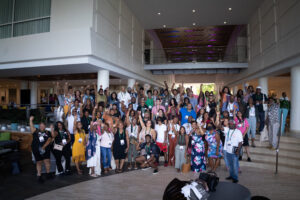Black Harm Reduction Network reimagines freedom, self-determination, equity
‘You never give up on a vision,’ says co-founder
“You never give up on a vision.”
Those are the words of Black Harm Reduction Network Co-Founder Joy Rucker, who sat down with National Harm Reduction Coalition to illuminate the history of the network’s origins and shed light on what the network is striving toward today – and the future it’s already building.
The initial concept of the collective was developed in the 1980s by the late Imani Woods, internationally known harm reduction pioneer, educator, Black community leader, and outspoken advocate for people who use drugs.
Fast forward to today, and the network is made up of people across the U.S., young adults through elders, with various lived experiences and perspectives including re-entry after incarceration, houselessness, HIV, policy, research, direct line staff, and transgender and queer representation.
Rucker said, “Essentially from the very beginning, the harm reduction movement was pretty white. Always has been – as white men in leadership, then white women, and very few people of color and African Americans in leadership in harm reduction that were running harm reduction programs, so we really felt that we were being asked as Black harm reductionists to go into communities and talk about equity and racial justice, and we would have young harm reductionists saying, ‘ We need mentoring, we need to figure out how as a Black person do I work in this white agency doing harm reduction?’”
“There was really nothing that spoke particularly to our issues – the incarceration, the housing issues, it was very focused on drug use, the War on Drugs, yes – but not the systemic issues that are impacted by the racism in this country that have become very harmful for us,” she said.
Rather than merely be hired for a couple of hours to provide their expertise through presentations and other related work for other organizations, the network’s members voted for the collective to become its own entity in 2022.
Now, the network is in the process of becoming a 501c3, has secured funding, developed a board of directors, and is working on bylaws and how the entity will be set up structurally. Rucker said they’re thinking the Black Harm Reduction Network will have hubs spread out across the country. The best way to operate, Rucker said, is “work with the people that are already entrenched in the community.”
The collective will provide technical assistance, mentoring, and leadership development as well as work on policy, fundraising, and networking. The network will serve as a national voice advocating for Black-centered federal and state public health, criminal legal system, and drug policies and support regional networks of Black-led and Black-centered harm reduction initiatives.

Photo courtesy of Joshua Uquillas
“We want to be involved in the policy around [harm reduction]. We need to be at every single table that has an impact on our community and we cannot continue to do it as individuals that work in different agencies,” Rucker said.
While the network represents areas across the U.S., the organization will focus on the south because of the lack of harm reduction services and support for people who use drugs. Though there is much work to be done to minimize the harm Black people – specifically Black people who use drugs – experience, the network has much broader goals on the horizon than filling gaps.
As the Black Harm Reduction Network’s vision states, “We believe that simply avoiding or reducing the effects of structural racism – manifesting as criminalizing substance use and mental illness – stops short of our mandate as Black harm reductionists. Reducing harm isn’t enough – it must be eliminated.”
Regardless of how the Black Harm Reduction Network’s work shifts over the years to come, Rucker said, the collective will always represent its membership and ask feedback of its members, “never forgetting that the membership gives us our direction.”
To learn more about the network, click here:
https://www.lac.org/major-project/black-harm-reduction-network
or reach out to the collective’s Facebook group page: https://www.facebook.com/groups/BlackHR.
